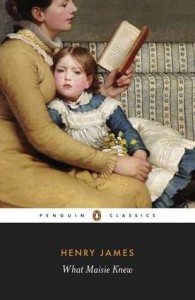 I read The Ambassadors and The Portrait of a Lady sometime in the early ‘90s, when I was in graduate school. They passed through my consciousness with nary a ripple; the impression that I carried away was…boredom. I wasn’t able to engage with any of the characters, and the elite social milieu of late Victorian/Edwardian England wasn’t of interest to me as such (give me a W. Somerset Maugham tale and it’s a different story). Recently, and after much mental to-ing and fro-ing, I picked up an audiotape version of The Turn of the Screw.)
I read The Ambassadors and The Portrait of a Lady sometime in the early ‘90s, when I was in graduate school. They passed through my consciousness with nary a ripple; the impression that I carried away was…boredom. I wasn’t able to engage with any of the characters, and the elite social milieu of late Victorian/Edwardian England wasn’t of interest to me as such (give me a W. Somerset Maugham tale and it’s a different story). Recently, and after much mental to-ing and fro-ing, I picked up an audiotape version of The Turn of the Screw.)Why I wish I could give it a full four stars:
The story. Maisie Farange is one of the most remarkable characters I’ve come across in my reading. James tells her story in the third person but entirely from her point of view. The result is that she’s present on every page, and the reader knows only what she sees and feels. It’s a remarkable, brilliant tour de force.
Why I can only give it three stars:
The writing style. It’s…dense. This is not a book one reads on the bus while your iPod blares the latest Beyoncé in your ears. James’ sentences are often Rube Goldbergian in their complexity. An only moderately discursive example: “He demurred. ‘Oh, no. She has written to me,’ he presently subjoined. ‘She’s not afraid of your father either. No one at all is – really.’ Then he went on while Maisie’s little mind, with its filial spring too relaxed, from of old, for a pang at this want of parental majesty, speculated on the vague relation between Mrs. Beale’s courage and the question, for Mrs. Wix and herself, of a neat lodging with their friend. ‘She wouldn’t care a bit if Mr. Farange should make a row.’” (p. 87)
One reviewer suggests the interesting idea that the convolutions mirror Maisie’s incomprehension about what’s happening around her but I’m not entirely convinced.
The complexity works in parts – and there are some wickedly acerbic characterizations – but more often (for me) it was too affected and kept me from immersing myself entirely in the story. Though the reading got easier as my brain got used to parsing the prose, I never got comfortable with it.
I may pick this up in a couple of years and reread it; it’s definitely a book that demands one.


